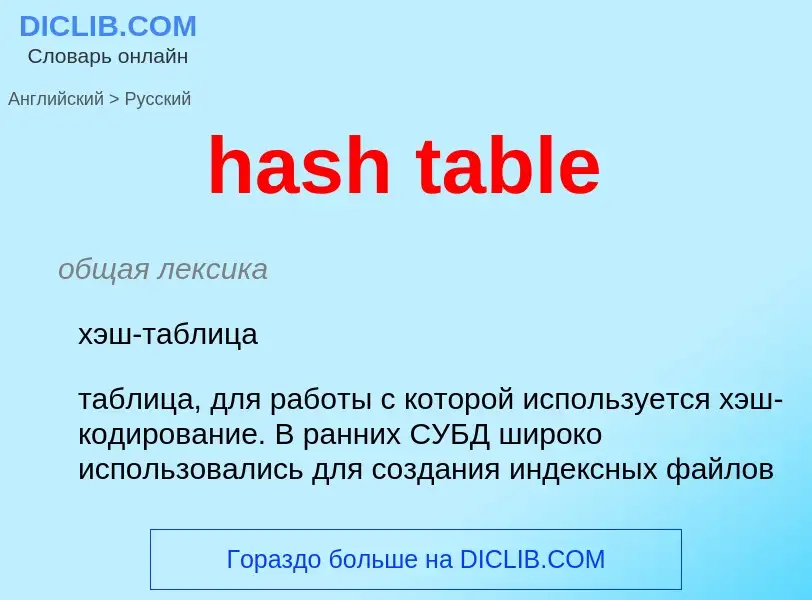Перевод и анализ слов искусственным интеллектом ChatGPT
На этой странице Вы можете получить подробный анализ слова или словосочетания, произведенный с помощью лучшей на сегодняшний день технологии искусственного интеллекта:
- как употребляется слово
- частота употребления
- используется оно чаще в устной или письменной речи
- варианты перевода слова
- примеры употребления (несколько фраз с переводом)
- этимология
hash table - перевод на Английский
общая лексика
хэш-таблица
таблица, для работы с которой используется хэш-кодирование. В ранних СУБД широко использовались для создания индексных файлов
Смотрите также
общая лексика
свёртка [профиль] сообщения
сжатая текстовая строка, полученная из текста сообщения применением односторонней хэш-функции (one-way hash function). Используется для создания цифровой подписи
Смотрите также
['hæʃmɑ:k]
жаргонизм
(нарукавная) нашивка
Смотрите также
существительное
собирательное выражение
нарукавная нашивка
- multiattribute hash
['teib(ə)lbuk]
существительное
общая лексика
книга в роскошном переплёте (лежащая на виду в гостиной)
записная книжка (для заметок)
книга таблиц
таблицы
хорошо изданная книга с иллюстрациями (лежащая обычно на виду в гостиной)
записная книжка
Википедия
In computing, a hash table, also known as hash map, is a data structure that implements an associative array or dictionary. It is an abstract data type that maps keys to values. A hash table uses a hash function to compute an index, also called a hash code, into an array of buckets or slots, from which the desired value can be found. During lookup, the key is hashed and the resulting hash indicates where the corresponding value is stored.
Ideally, the hash function will assign each key to a unique bucket, but most hash table designs employ an imperfect hash function, which might cause hash collisions where the hash function generates the same index for more than one key. Such collisions are typically accommodated in some way.
In a well-dimensioned hash table, the average time complexity for each lookup is independent of the number of elements stored in the table. Many hash table designs also allow arbitrary insertions and deletions of key–value pairs, at amortized constant average cost per operation.
Hashing is an example of a space-time tradeoff. If memory is infinite, the entire key can be used directly as an index to locate its value with a single memory access. On the other hand, if infinite time is available, values can be stored without regard for their keys, and a binary search or linear search can be used to retrieve the element.: 458
In many situations, hash tables turn out to be on average more efficient than search trees or any other table lookup structure. For this reason, they are widely used in many kinds of computer software, particularly for associative arrays, database indexing, caches, and sets.

![This graph compares the average number of CPU cache misses required to look up elements in large hash tables (far exceeding size of the cache) with chaining and linear probing. Linear probing performs better due to better [[locality of reference]], though as the table gets full, its performance degrades drastically. This graph compares the average number of CPU cache misses required to look up elements in large hash tables (far exceeding size of the cache) with chaining and linear probing. Linear probing performs better due to better [[locality of reference]], though as the table gets full, its performance degrades drastically.](https://commons.wikimedia.org/wiki/Special:FilePath/Hash table average insertion time.png?width=200)
.jpg?width=200)




